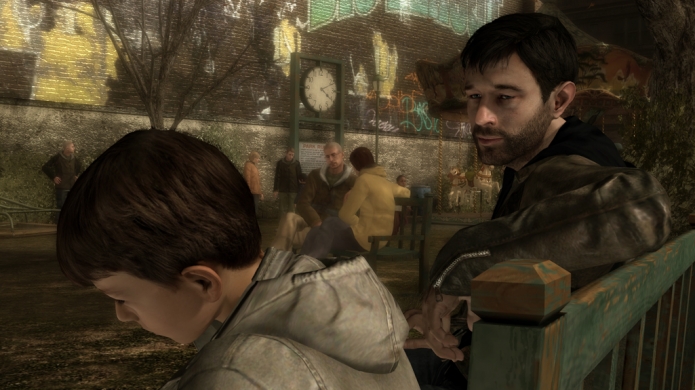Heavy Rain: The story of Heavy Rain revolves around the presence of the Origami Killer, a serial killer who abducts young boys and drowns them in rainwater after several days, leaving an orchid in their hands and mud on their faces. Most importantly, however, most of the game revolves around the abduction of Shaun Mars, the son of one of the main characters, Ethan, and is a race against the clock to prevent Shaun's untimely death (caution, spoilers ahead).
Ethan and Shaun Mars
Much of the story is centered on Ethan Mars and his attempts to save Shaun from his fate, and are redoubled as a result of his guilt for a car crash that resulted in the death of his first son Jason and Ethan lying in a coma for six months, shortly thereafter resulting in his divorce from his wife (which is only ever alluded to, but never mentioned directly). You find out later on in the game, through messages received by Ethan from the Origami Killer, that he, the father, must prove he has the strength and courage necessary to save his son through a series of trials. If you play the game so that Ethan survives to see the end of the game (your actions have consequences here), you find Shaun in a grate-covered hole in an old factory, and have to break the lock to rescue him.
What's interesting about this final part, and the game in general, is the connection you as the player feel with this computer-generated little boy. Throughout the course of the game, while you are put through trials, you are given the option to walk away from them. While your choice to do so will alter the ending of the game, you will progress through the game regardless, giving no practical reason to go through all the effort of completing the trial, save one: your own connection to the relationship between this father and his son. I found myself genuinely caring about the well-being of Ethan after, through my actions, he suffered electrical burns attempting to navigate a series of live wires to ascertain a clue to the location of his son. I frequently reanalyzed evidence and clues to Shaun's whereabouts to make sure I had the correct address so that I would not put him in danger. When trying to free Shaun from his cage that was slowly filling with rainwater, I found myself frantically tapping buttons to work faster at releasing him, desperately racing against time and then audibly breathing a sigh of relief when I was successful in extracting and then resuscitating him. Below, I have posted this scene from the game:
Also worth noting as both an extension and a conclusion to my previous thought is the reason for the determination in this type of game to save this child, which is the simple fact that it is a child. Whether it be because its a biological imperative programmed into us to protect children, or simply our empathetic understanding that this is a small creature that loves unconditionally and relies on you for your protection, you feel a kinship to this computer-generated child, and their survival becomes directly linked to the survival you perceive for yourself. Although I know nothing of being a father, I imagine this game emulates the relationship between a father and his son to a degree not seen before in a video game.


No comments:
Post a Comment